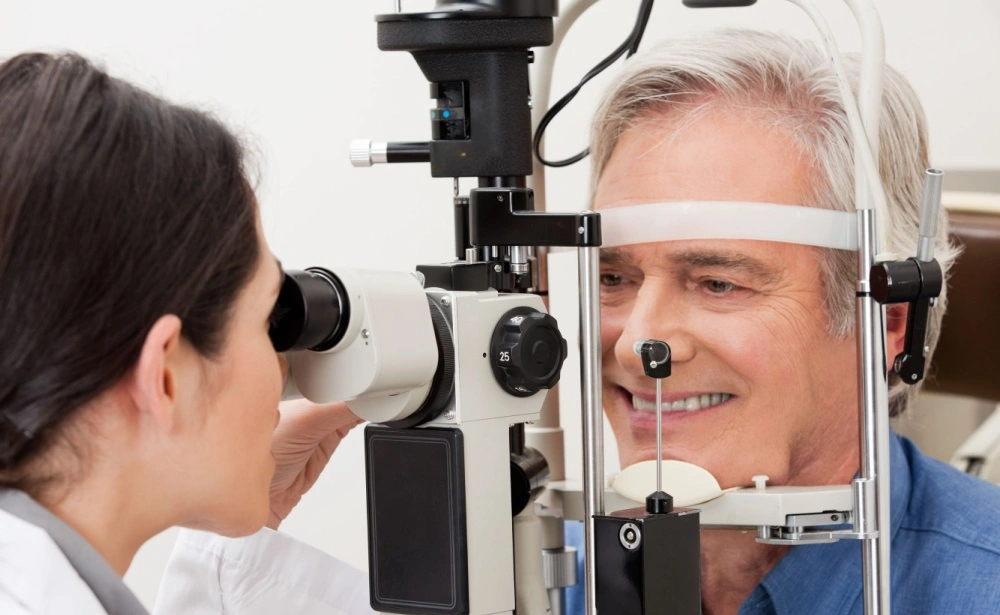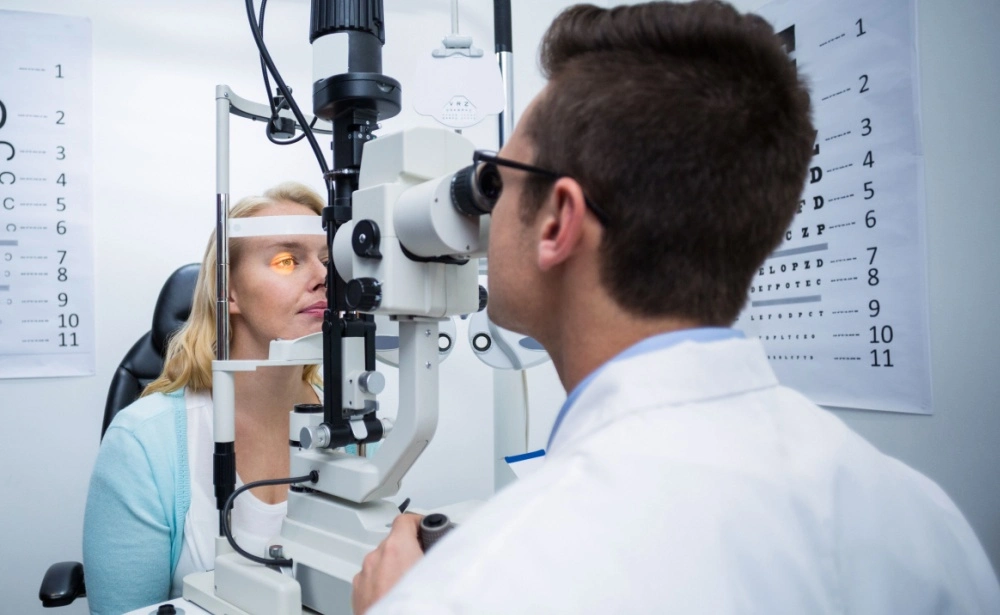
Clinical Study Participants
As a leader in eye care, Cincinnati Eye Institute is active in conducting clinical research for advanced eye care treatments. We regularly have opportunities for adults to participate in clinical studies for a variety of ocular medications and ophthalmological procedures. Participants may be needed to develop treatments for a variety of conditions, ranging from common eye issues such as glaucoma, cataracts, and dry eyes, to rare eye diseases.
- What is a Clinical Study?
- Benefits of Volunteering for Clinical Research
- What to Expect When You Volunteer to Be a Study Participant
- How Do I Become a Participant in a Clinical Study?
- How Do Clinical Trials Work?
- Clinical Research Phases
- Who Pays for Clinical Trials?
- Clinical Study Participant Rights and Safety
What is a Clinical Study?
A clinical study is a process that is conducted to understand if new drugs, treatments and devices are safe and effective. The terms Clinical Research, Clinical Study, Clinical Trial, and Clinical Protocol all concern the same topic.
Clinical studies that people participate in cannot happen until basic research in a laboratory determines the new treatment, drug or device is sufficiently successful and safe for the FDA to approve continuing the research and beginning to test in people. Carefully controlled and well-designed clinical trials are performed by highly trained medical professionals to understand how this new treatment will work in people.

Benefits of Volunteering for Clinical Research
- Gain access to leading-edge treatments that may not be generally available
- Feel the satisfaction of helping to develop better treatments for frustrating and sight-limiting eye problems
- Be part of a higher level of care and to have repeated access to the physician conducting the study
- Receive all study-related doctor visits, diagnostic testing, and study treatments at no charge to you or your insurance company
- Benefit from the compensation for your time and travel
How Do I Become a Participant in a Clinical Study at Cincinnati Eye Institute?
Your eye doctor can let you know if you may be a candidate for a clinical study. If you or someone you know is interested in being a participant in our clinical research studies, or if you have questions about current and upcoming studies at CEI, please contact the Clinical Research department by calling 513-569-3688 or join our click here to join our research registry. Qualified participants may receive health assessments and study-related medical care. Reimbursement for your time and travel may be provided.
Whatever your reason might be, your participation ultimately offers hope of better, safer treatment options for maintaining one of our most precious senses, our sight. Many new treatments get delayed because not enough people knew they had the opportunity to get involved.
What to Expect When You Volunteer to Be a Study Participant at Cincinnati Eye Institute
Anyone can apply to take part in a clinical trial, although only volunteers who meet the specific criteria for a research study will be able to participate. When you apply to be a study participant, you can typically expect these steps:
- You will be contacted by our Research team when we have a study that seems to be well-suited to your ophthalmic condition.
- You will be evaluated to make sure you qualify for the trial. This typically involves a series of questions during a phone call with our clinical study coordinator. Sometimes, we need you to come to our office for visual testing to ensure you meet the guidelines of the study. Any testing will be completed at no expense to you.
- If you meet the guidelines for this particular clinical trial, you will meet with our clinical study coordinator.
- Our study coordinator will explain all of the information about this study, including treatment details, risks, benefits and your rights as a research volunteer. You will also be able to ask any questions you may have. If you would like, the physician conducting the study will also be available to discuss any aspects of the study. They can also clarify what you are consenting to as a participant in this study. We want to make sure you completely understand what it will be like to be in this study, as well as the benefits and risks of participating.
- Once you completely understand the study and have any questions answered, you will need to decide if you want to participate. If you wish to proceed, we will ask you to sign a legal document indicating you fully understand the study, what we expect of you, and the potential risks and benefits. This document is called the Informed Consent.
- After signing the Informed Consent, you are officially enrolled in the study.
- You will have frequent contact with our clinical study coordinator and our ophthalmologist who is in charge of the study. They will keep you informed, coordinate any office visits, and monitor you closely.
How Do Clinical Trials Work?
Clinical Trials are conducted in four phases that occur in sequential order. Each phase tends to have a different purpose and helps answer different questions. Each phase is considered a separate trial. After completion of each phase, the FDA must approve before continuing to the next phase. Research participants do not need to be part of all phases of a clinical trial.
Clinical Research Phases
Phase I
20-100 people (typically healthy volunteers)
- To find an appropriate dose
- To decide how the new treatment should be given
- To learn if there are any side effects

Phase II
200-300 people (volunteers have condition or disease)
- To learn about new treatments’ effectiveness
- To learn if there are any side effects

Phase III
100s to 1000s (volunteers have condition or disease)
- To compare the new treatment (or new use of a treatment) with the current standard treatment
- If new treatment shows promising results, FDA approval for marketing can be requested

Phase IV
1,000s of people
- To further assess long-term use
- To identify other uses of treatment for other conditions or diseases

All clinical studies are closely monitored by the FDA and an independent Institutional Review Board to make sure the study is necessary, is being conducted in an ethical way, does not put participants at undue risk, and that patients rights and safety are protected throughout. Participation in clinical studies is completely voluntary.
Who Pays for Clinical Trials?
The FDA requires that participants in clinical studies receive all study-related doctor visits, diagnostic testing and study treatments free of charge. This is in return for being a willing participant in the clinical trial.
The sponsor of the study (such as the government or pharmaceutical and technology companies) typically pays for all costs involved with a clinical research study. This includes supplying the new treatment, as well as any special testing, possible extra physician visits, and research costs involved in the clinical studies. Each study sponsor identifies top nationwide physicians to partner with to administer the actual study with qualified patients.
The clinical trials that Cincinnati Eye participates in are sponsored by pharmaceutical and biotechnology companies. By partnering with these well-recognized companies, we have developed strong relationships that keep us at the forefront of vision care advances.
Clinical Study Participant Rights and Safety
When you agree to participate in one of our clinical studies, you have the right to:
- Know what the study involves and how long it will last
- Be told all known risks and benefits involved in the study
- Know what is expected of you
- Right to medical treatment for any study-related injury
- Leave the study at any time for any reason
- Receive any new information about the treatment
- Continue to ask questions and get answers
- Maintain your privacy. Your name and personal information will not appear in any reports or articles about the study.
- These are all explained in further detail in the legal Informed Consent document. You will be required to sign this document before participating.
When you participate in one of our clinical studies, your eye health will be our foremost priority. Our entire research team is certified in the Protection of Human Services in Clinical Studies and we maintain strict adherence to Good Clinical Practice.
Research Registry
The doctors at Cincinnati Eye Institute have either authored or reviewed the content on this site.